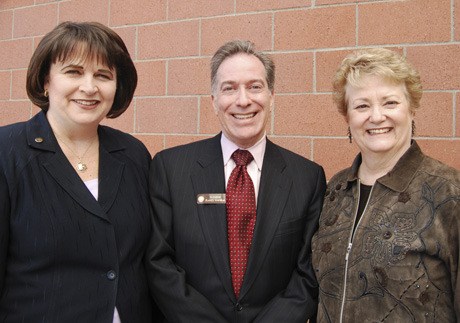The Mercer Island Chamber of Commerce hosted District 41 state legislators Judy Clibborn, Marcie Maxwell and Randy Gordon at its monthly luncheon on April 8. The representatives each spoke on their personal area of expertise: Clibborn on transportation, Maxwell on education and Gordon on state taxes.
According to Clibborn, “transportation is making more bipartisan headway than any of the other budgets.”
The tension is not so much between parties, she said, but rather between “Democrats and Democrats, and between the House and the Senate.”
But King County transportation is moving forward. The Island representative said that she was happy with plans for the Alaskan Way Viaduct and seawall replacement project. According to WSDOT, major construction on the decades-old elevated SR-99 highway begins this summer. Engineers and environmentalists are still reviewing three alternatives for the viaduct’s central waterfront section: a cut-and-cover tunnel; elevated structure alternatives, and a bored tunnel alternative recommended in January 2009.
Island-centric concerns, however, revolve more around I-90 and SR-520. Clibborn briefly mentioned the I-90 tolling debate, which has been put off by legislators for later discussion, as well as plans for the new 520 bridge.
Maxwell turned the conversation to education. With several school district representatives and Island Schools Foundation members in the audience, ears perked up.
Indeed, the Legislature is still debating how to handle monstrous cuts to the state’s education budget as of Reporter deadline. At the beginning of the legislative session, it appeared that MISD would be required to slash its budget by up to $1.5 million. More optimistic figures hover around cuts of $740,000. MISD has already cut $3 million in the past three years.
Maxwell empathized with her listeners, reminding them that positive changes have also been made.
“We got some good things accomplished for our district,” she said, mentioning House Bill 2776, which establishes a new school funding model that will simplify the budgeting process and increase transparency.
It requires a “phase-in” of smaller classes of 15 students in kindergarten through third grade by the 2015-2016 school year, along with more funding for maintenance and operation costs. The bill will implement a new student transportation funding method, as well as push for teacher compensation.
Senator Randy Gordon, who was appointed to fill the seat vacated by Fred Jarrett, spoke about his first months’ experience as a “freshman senator”. He attributed much of his success to the fact that he has a strong legal background.
Gordon was sworn in the day after the legislative session started. He has already sponsored several bills, two of which have passed.
When asked about the Legislature’s decision to grant school districts a temporary 4 percent levy lid increase to offset budget woes, Gordon said that the disparity between districts’ abilities to fund levies is the state’s main problem.
“Some districts can fund levies. Others cannot. There’s no correlation between a district’s need for money and a district’s getting money. This disparity is a constant issue, and full funding at the state level is the final answer,” he said.
For more information on this year’s legislative session, visit: http://www.leg.wa.gov.



